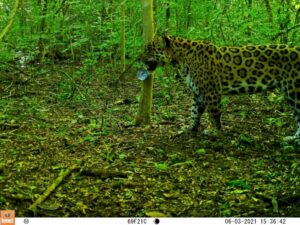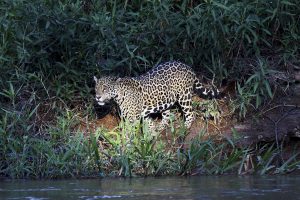A strange fungus, called Rhodotorula sp., and the parasite Cochliomyia hominivorax, raised alarms in Misiones after being detected in a jaguar specimen. The novelty and puzzlement at these presences were so significant that the case was presented at the 10th Argentine Congress of Parasitology, held in early May in Puerto Iguazú.
According to scientists, this finding has profound implications for the ecology of this feline, as it can cause severe infestations that can be fatal. For this reason, experts argue that this discovery opens up new lines of research on interactions between parasites and hosts.
Furthermore, specialists added that its implications are not exclusive to the jaguar, but could also affect livestock and domestic animals. However, they mention that this first finding in the jaguar is an emblematic event in the study of larvae and parasites.
The research is led by biochemist Katherina Vizcaychipi, from the Misiones Institute of Biodiversity (Imibio) and the Institute of Tropical Medicine (Inmet). It also involves the participation of Güira Olga, Prem (Fceqyn-Unam), the Veterinary Research Institute of the University of Salvador, and the Jaguar Project.

A discovery that could save several jaguar specimens
The finding was made from samples obtained in the nasopharyngeal cavity of the animal, through different techniques and cultures. This is how they detected the presence of the fungus Rhodotorula sp., larvae corresponding to Cochlimyia hominivorax, which were found on the animal’s back.
In addition to taking the sample that revealed the presence of the fungus and the parasite in the jaguar, specialists took other genetic samples in order to strengthen Imibio’s Biobank to continue assisting in the conservation of the largest feline on the continent.

Small but dangerous
It is no news that fungi and parasites can affect both jaguars and other wild animals. It is known that these organisms can cause different diseases that weaken them and make them vulnerable to their predators.
There are different types of parasites: internal and external. The former, known as intestinal parasites, can weaken animals and reduce their hunting capacity. The latter can cause itching, irritation, and in some cases anemia or skin diseases.
Toxic fungi, on the other hand, can cause liver damage, digestive problems, and neurological symptoms in animals.

